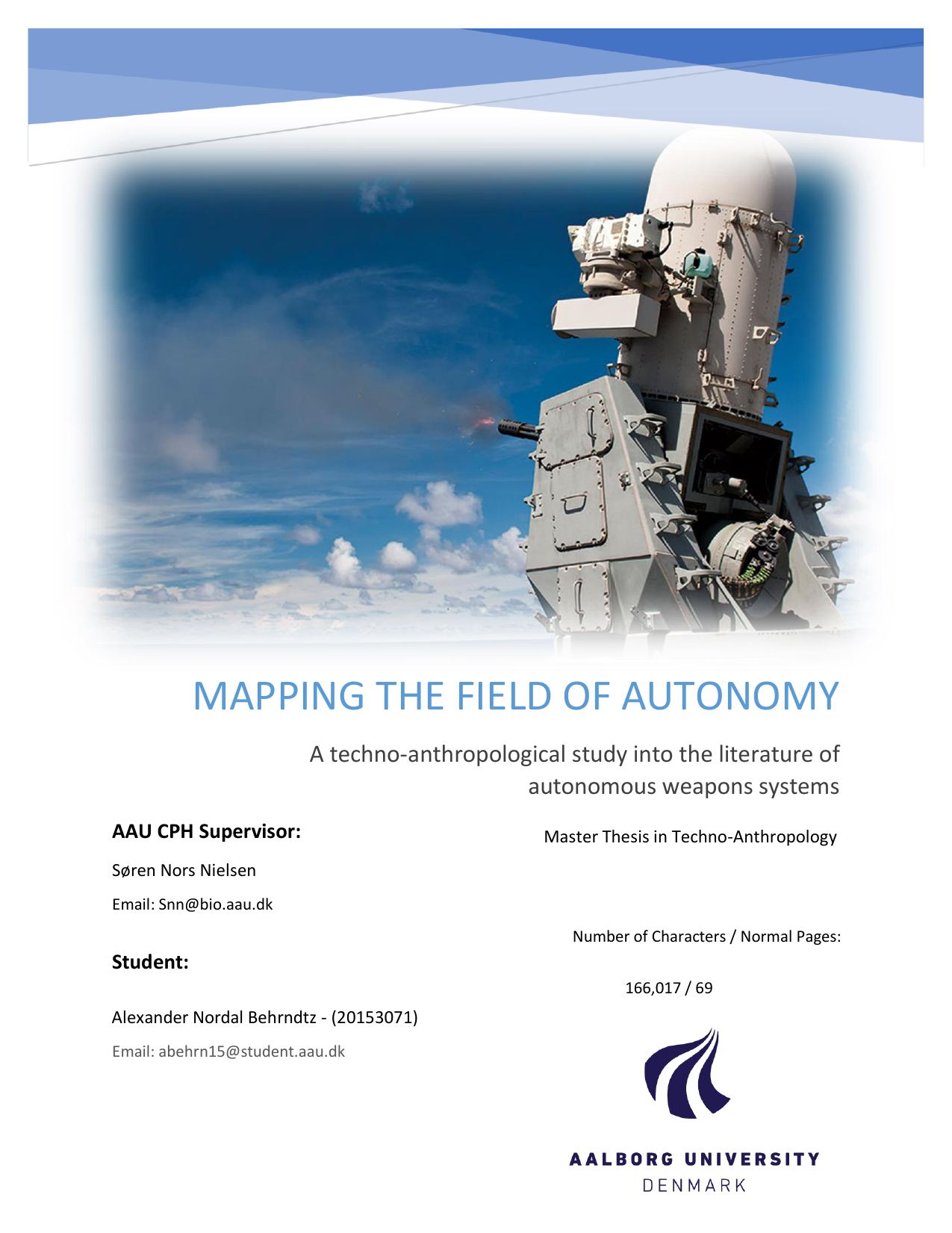
MAPPING THE FIELD OF AUTONOMY: A techno-anthropological study into the literature of autonomous weapons systems
Author
Term
4. term
Education
Publication year
2020
Submitted on
2020-09-04
Pages
69
Abstract
De seneste års fremskridt indenfor autonome har revolutioneret den moderne slagmark og metoder til at føre krig. Alt peger på, at dødelige autonome våben vil blive den nye standard i aktive krigszoner i en nær fremtid. Udviklingen indenfor særligt informationsteknologierne driver denne udvikling fremad, og maskinlæring har løftet potentialet for kunstig intelligens til nye højder. Med sådanne muligheder, kommer der også store udfordringer. Konsekvenserne af disse teknologier vil ikke kun være moralske og etiske, men juridiske, politiske, fænomenologiske, sociale, psykologiske og meget mere. Men centralt i diskussionen er der opstået spørgsmål om ansvar. For hvem er ansvarlig for selvtænkende teknologier? Hvad sker der, når et teknologisk system opfører sig uforudsigeligt eller (i menneskeligt perspektiv) på ulogiske måder? Vil robotter en dag stå foran en domstol for deres handlinger, eller er ansvaret kun menneskeligt? - Dette er nogle af de spørgsmål, der stilles i debatten om autonome våbensystemer i dag. Denne afhandling er ikke et forsøg på at løse alle disse udfordringer, men er en eksplorativ rejse ind i felten omkring autonome våbensystemer. Ved hjælp af en aktør-netværks teoretisk og postfænomenologisk forståelse forsøger denne afhandling at fremme forståelsen for, hvordan denne emergerende teknologi medfører forhandlinger og translationer på kryds af store aktør-netværk, samtidig med at den forsøger at præsentere en teoretisk ramme for videre undersøgelser ind i dette komplicerede felt.
With the advances within autonomous technologies, it is no longer hard to believe, that Lethal Autonomous Weapons Systems (LAWS) could become a standard in active warzones in a near future, if not tomorrow. The introduction and evolvement of drone technology, machine-learning, improved A.I., and other contemporary information- and communication technologies (ICTs), the possibilities of war-machines have reached an all new high. But as should be evident by now, these possibilities have led to hard questions and impasses have emerged. The effects of these new technologies are not only moral, ethical, and technical, but also legal, phenomenological, social, psychological, political, and much more. The challenges emerging around these technologies can truly be labeled as wicked , with no single solution or simple answer available. Central to the discussion are the issues of responsibility and accountability. Who stands responsible when technology acts on its own? What happens if a technological system behaves and decides for itself in unpredictable or (in the eyes of humans) in illogical ways? Will robots one day stand themselves in front of a court for their actions or is responsibility inherently human? This thesis is not an attempt at solving all of the controversies surrounding autonomous weapons technologies. This thesis is an attempt to examine and discern how some of these debates about autonomous technologies are understood, represented, and discussed. This is all done in an attempt to further the understanding of the consequences of what these technologies might bring, as well as how to face some of these effects. This is done by first applying an Actor-Network Theoretical lens to understand and investigate the relations and worlds of autonomous weapons systems. On the background of this analysis, an postphenomenological embodied analysis is then applied to better understand how these technological relations mediate human understanding and action.
Keywords
Documents
